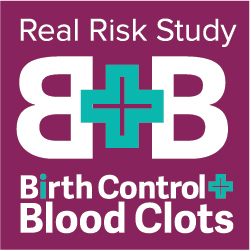A few months ago, Lucine Health Sciences and Hormones Matter began a pilot study looking at risk factors and warning signs/symptoms in women who have developed blood clots while using hormonal contraception. This study consists of a survey questionnaire, and a personal story/case report, which is shared on Hormones Matter with the study participant’s permission. We would like to thank all of the women who took the time to complete our survey and who courageously shared their stories to help inform our research.
This phase of the study will close on July 25, and we will then perform a full data analysis on all of the results. In the mean time, we have already written about some of our early results here and here. What we have learned so far from our survey results suggests that some information that is commonly accepted about the risks for blood clots on hormonal birth control may not be true, and that the risk information is not communicated to women in a realistic and truthful way.
What We’ve Learned So Far
Early Survey Results
Many blood clots develop after years of use. Although it is thought that the risk for developing a blood clot is highest in the first year after starting or restarting hormonal contraception, our data to date show that 75% of women developed clots after the first year on the medication, and only 25% developed clots within the first year. Many women developed clots even after significant lengths of time on the medication, in some cases, even after up to 21 to 30 years.
Smoking is a risk but not THE risk. Many women are led to believe, by information provided to them by pharmaceutical companies and their doctors, that they are only at risk of a blood clot if they are over 35 years old, and smoke. However, 94% of women in our study were not smoking at the time of the blood clot, and 78% had never been smokers. Smoking does increase the risk, but the idea that you are only at risk of you are a smoker is false.
Clotting disorders are not identified. We also discovered that women are not being tested for blood clotting disorders that significantly increase their risk of developing a blood clot while on hormonal contraception. Fully 89% of the women in our study did not have such testing prior to starting hormonal contraception, and a further 9% did not know if they had any testing. Only 2% of the women were able to state with certainty that they had been tested.
These results, as well as additional results, will be explored further when the study is complete. We will be looking at women’s ages when they developed blood clots, warning signs and symptoms, other side effects from hormonal birth control, additional risk factors, and more.
Personal Story Findings
At Hormones Matter, we believe strongly in the power of the personal story. Like case reports, they give us a breadth and depth of information that cannot be captured as well in the more quantitative results. As part of this project, we have been collecting and publishing these stories. In addition to the trends emerging from the survey results, we’re seeing several disturbing trends regarding whether and how risks for blood clots are communicated, tested for and/or identified. In most cases, there appears to be a significant disconnect regarding these risks.
Risks for blood clots are not communicated. What do these stories have in common? The women who developed clots were not aware that these serious complications could develop as a result of hormonal contraception. Laura Buccellato, whose daughter Theresa died at age 16 from a pulmonary embolism, said in her story
“Our doctor did not go over any of the side effects with us or what to look for if something were to go wrong. I trusted my OBGYN because I have been with her for most of my life and she had four children so I never felt she would put Theresa in any kind of harm.”
If women are taking a medication with the possibility for serious injury or death, they should certainly be informed of risks. They should also be educated about early warning signs and symptoms of blood clots.
Signs of blood clots are not recognized by physicians. Another common and disturbing trend has emerged from the personal stories: in the early stages, and sometimes even in the later stages of the blood clot event, blood clots are not considered in the differential diagnosis. More often than not, when women approach their physicians with signs pointing to blood clots, they are dismissed. The possibility of having a blood clot is not investigated or even considered, and most doctors do not even ask the patient about their use of hormonal birth control. For example, Kerry Gretchen was suffering from the symptoms of a blood clot in her brain for a month, and was sent home from the emergency room twice and told that her symptoms were due to a migraine. This resulted in even more severe effects from her stroke. Susan Eklund McKenzie had taken her daughter Marit to the doctor twice for symptoms related to a pulmonary embolism, but unfortunately this was never investigated, and Marit died at age 18.
Blood clots are devastating. Another commonality is just how catastrophic these blood clots can be. The women who have had strokes (stories are here, here and here) all had to relearn how to perform the daily functions of life, such as walking, writing, showering and dressing themselves, and some of the women have lasting disabilities.
It is known that pulmonary embolism has a high mortality rate, and the women whose stories we have shared who suffered from a pulmonary embolism, all died as a result (stories are here, here and here). Brittany Malone had a massive blood clot in her leg, and as a result suffered pulmonary hemorrhage, respiratory failure, heart attack, irreversible brain damage, and death.
We would all like to think that this could never happen to us, but as Detrease Harrison said, in her story of having a stroke after 23 years on the birth control pill:
“I used to tell people I had no risk factors for having a blood clot, but almost everyone has some kind of risk factor.”
Participate In The Birth Control and Blood Clots Study
There are two weeks left in this phase of our study, and then the survey will be taken down and to analyze the results fully.
If you are a woman who has suffered from a blood clot while using hormonal birth control, we urge you to participate in our study to help us learn more about this important women’s health issue.
Because of the severity of some blood clots, including death or serious disability, we allow parents, family members, or partners to take the survey for the affected individual.
If you know someone who might like to participate, please share this article with them.
If you have begun the survey and haven’t yet completed it, please do so in order to enable us to use your data. We cannot use your data, if the survey is not complete.
If you’ve completed your survey but haven’t yet sent us your story, please do so.
We will be continuing to share women’s stories over the next few months, so please continue to follow the study on the Hormones Matter website, on our Facebook page, and on Twitter.












Does it matter how long ago (over 20 years)? Also they were not officially diagnosed, but after having them in the last 10 years, I know that is what I had when I tried BC pills.
Hi Cassie,
Please email me at bloodclotstudy@hormonesmatter.com, and we can discuss your situation in a bit more detail and determine if you are eligible to participate. Thank you!
Philippa